15 Powerfully Inspiring Quotes From Anti-Apartheid Activist Winnie Madikizela-Mandela
"There is no longer anything I can fear."
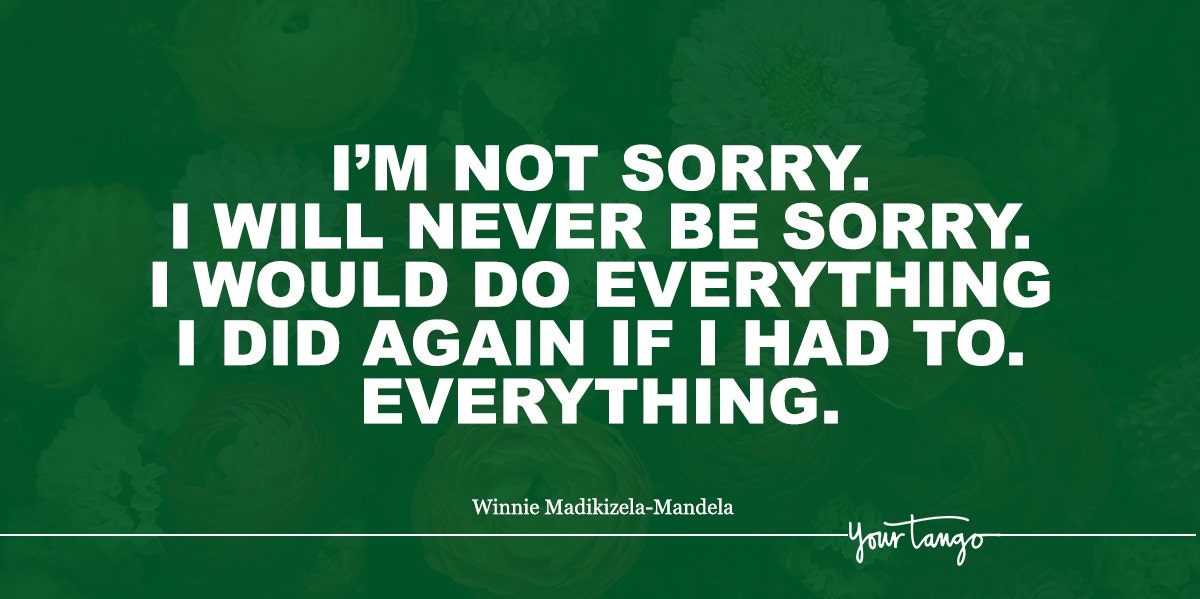
Winnie Madikizela-Mandela, an intensely polarizing figure in South Africa and throughout the world, considered by many to be "the Mother of the Nation," died at the age of 81 in Johannesburg, South Africa, early on the morning of Monday April 2, 2018.
According to her spokesperson Victor Dlamini, Madikizela-Mandela died the Netcare Milpark Hospital “after a long illness, for which she had been in and out of hospital since the start of the year.”
Her health had been worsening over the last several years, during which time she was treated for diabetes and underwent multiple surgeries, and this past Friday she was taken to the hospital complaining of flu-like symptoms after attending church services.
If you're a bit lost and wondering, "Who is Winnie Madikizela-Mandela?" because you don't know who she is, you should — and I mean that with both as little sass as I can possibly muster, as well as with the full awareness that many of us in the United States tend to live in our own little bubbles, particularly when it comes to issues of race.
Madikizela-Mandela was the second wife of "South African anti-apartheid revolutionary, political leader, and philanthropist" Nelson Rolihlahla Mandela, who served as President of the African National Congress (ANC) party (from 1991 to 1997) and as the first democratically elected President of South Africa (from 1994 to 1999) after spending 27 years in prison, initially on Robben Island, and later in Pollsmoor Prison and Victor Verster Prison.
What is lesser known outside of South Africa is the powerful and controversial role Madikizela-Mandela herself played in the anti-apartheid movement throughout her lifetime.
Born Nomzamo Winifred Zanyiwe Madikizela on September 26, 1936, in the village of Mbongweni, Bizana, in the Transkei, she completed a degree in social work at the age of 19.
At that time, she "was offered a scholarship for further study in the USA. However, soon after receiving the scholarship offer, she was offered the position of medical social worker at the Baragwanath Hospital in Johannesburg, making her the first qualified, Black member of staff to fill that post. Following an agonizing decision about whether to leave and further her academic career in the USA, or to stay and pursue her dream of becoming a social worker in South Africa, she decided to remain in South Africa."
Madikizela-Mandela married her only husband on June 14, 1958, and gave birth to the first of their two daughters, Zenani, in 1959, and to their second, Zindziswe, in 1960, less than one year before his nearly three decades of incarceration began in August 1961.
Over that lengthy span of time, Madikizela-Mandela was viewed by many as her husband's virtual surrogate.
According to South African History Online (SAHO):
"The police, sensing Winnie’s potential to carry the cause, slapped her with a banning order on 28 December 1962. This restricted her movements to the magisterial district of Johannesburg; prohibited her from entering any educational premises and barred her from attending or addressing any meetings or gatherings where more than two people were present. Moreover, the banning order also stipulated that media outlets were no longer permitted to quote anything she said, effectively gagging her voice too."
She was left struggling to make ends meet, as she was subjected to multiple forms of trauma and harassment, from middle of the night raids by police to security insisting her children be expelled from schools to be hounded out of all forms employment and far worse.
In particular, the 491 she spent in solitary confinement and eight years she spent in banishment from Soweto, which she spent under house arrest the border town of Brandfort, had a tremendous impact on her perspective, as well as her strategic disposition as an activist and, later, politician.
"During the long years that Nelson had been in jail and Winnie had been struggling by herself," continues SAHO, "the couple had moved in starkly opposite directions. Whilst Nelson and his Robben Island coterie had become more academic and statesman-like during their years cut-off from grassroots politics, Winnie on the other hand was forced to become a soldier on the ground."
As reported in The Washington Post:
"When a defiant Mrs. Madikizela-Mandela returned to Soweto in 1985, it was a far more violent place than she had left, crawling with gangs and police brutality. Her rhetoric fit right in.
'We have no guns — we have only stones, boxes of matches and petrol,' she said at a rally in April 1986. 'Together, hand in hand, with our boxes of matches and our necklaces, we shall liberate this country.'
'Necklacing' was a method of killing, often used against suspected police informants, in which a gasoline-soaked tire was forced around someone’s body and then set alight. The speech caused an international outcry, particularly in western capitals."
When Nelson Mandela was finally released from prison in 1990, Madikizela-Mandela was there by his side. However, the two separated in 1992 and he was granted a divorce in 1996 amid his allegations that she had been unfaithful.
Over the course of the 90s, Madikizela-Mandela was convicted of kidnapping and being an accessory to assault (the second of which charges was later overturned), condemned for human rights violations by the the Truth and Reconciliation Commission, chaired by Archbishop Desmond Tutu. Soon after, "She was reelected to Parliament in 1999, only to be convicted of economic fraud in 2003. She quickly resigned from her post, though her conviction was later overturned."
There is no denying that Madikizela-Mandela was a complicated figure.
Pushed into the spotlight by the nature of her marriage, she long resented being viewed as simply, "Mandela's wife," preferring to be recognized as "Mama Winnie," a central figure in the story of the revolution of South Africa.
Madikizela-Mandela was a brave and deeply tortured woman who made more than her share of mistakes, and in many respects, she owned up to them. She was also a powerful, outspoken, and understandably angry woman in an era when being just that was all it might take to end your life.
Yet instead of hiding in the shadows as some may have rightfully chosen to do, she took advantage of her position and her voice in an attempt to make true and lasting change for the better in this world.
To further illustrate the significance of her work and motivate others in their quest to make the world a better place, here are 15 of the most powerful words and the best Winnie Madikizela-Mandela quotes to remember her by.
1. She refused to allow her gender to be used against her.
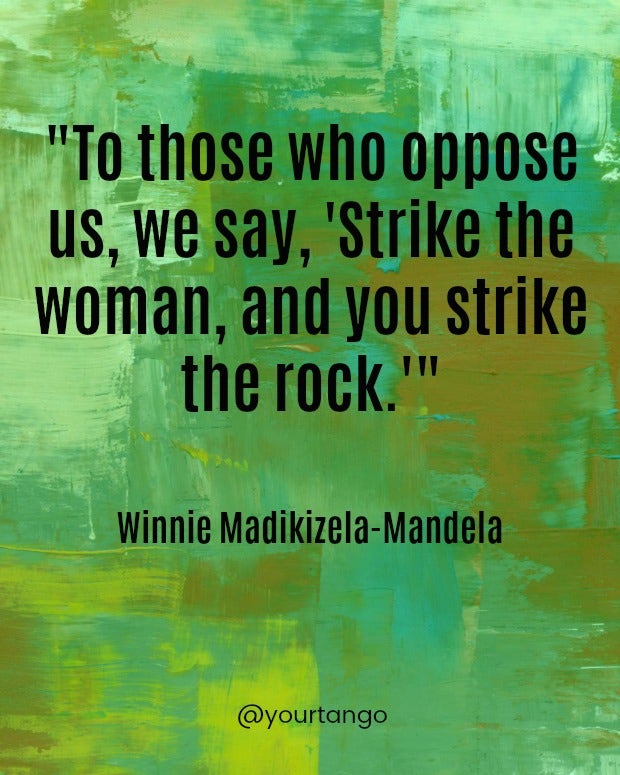
"To those who oppose us, we say, 'Strike the woman, and you strike the rock.'"
2. She was open about those things that defined her, for better or worse.
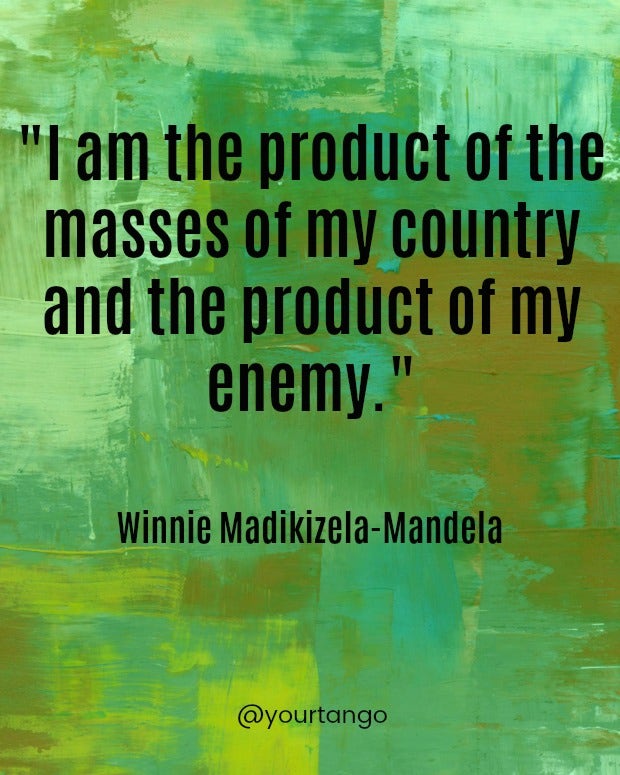
"I am the product of the masses of my country and the product of my enemy."
3. She believed the key to a brighter future rested firmly in educating the children.
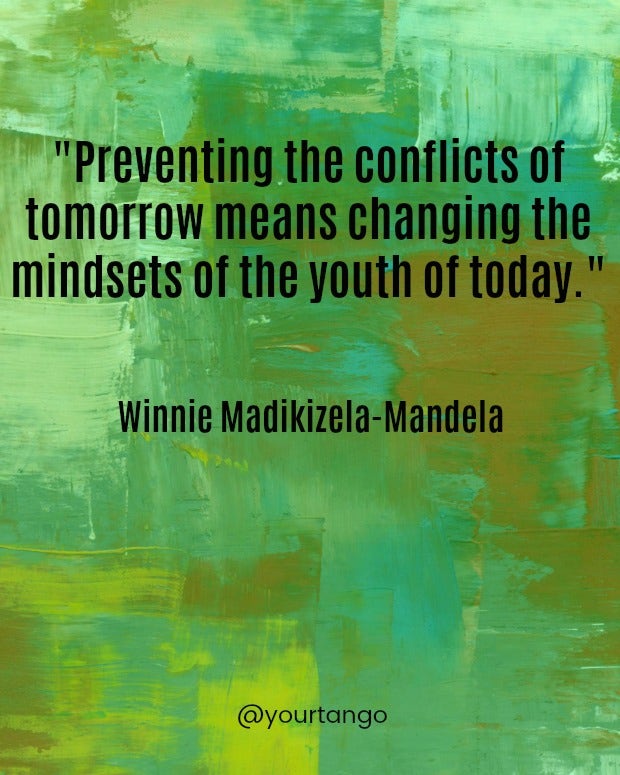
"Preventing the conflicts of tomorrow means changing the mindsets of the youth of today."
4. When her then-husband was imprisoned, she would not stop fighting for what they both believed in.
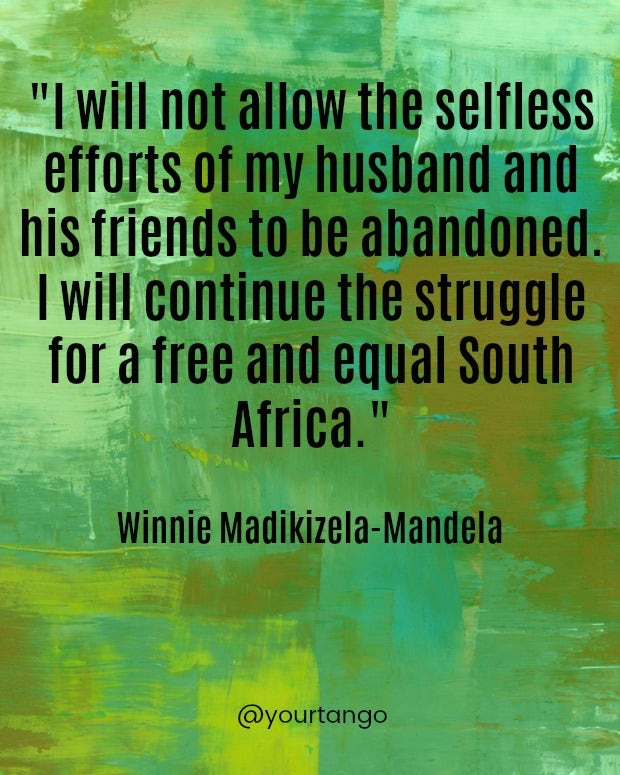
"I will not allow the selfless efforts of my husband and his friends to be abandoned. I will continue the struggle for a free and equal South Africa."
5. When asked how she could be so brave, she held nothing back.
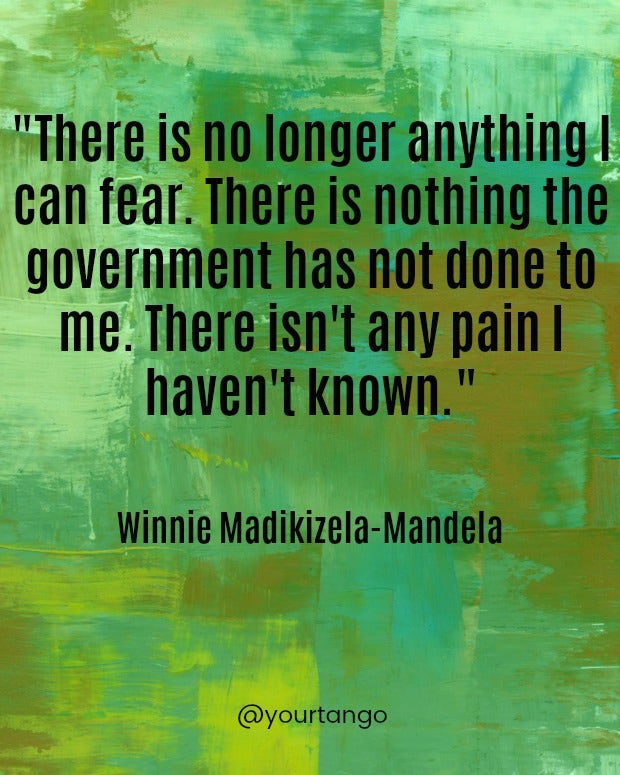
"There is no longer anything I can fear. There is nothing the government has not done to me. There isn't any pain I haven't known."
6. She knew the importance of unity.
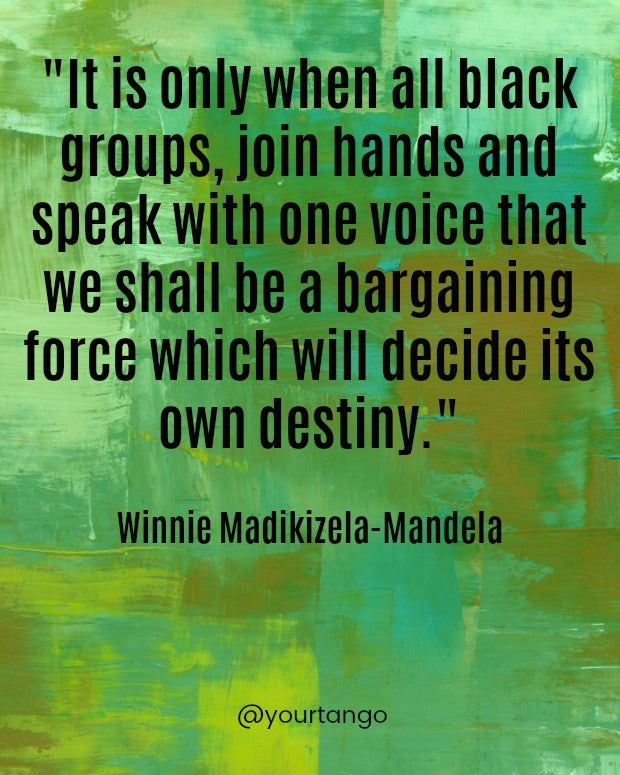
"It is only when all black groups, join hands and speak with one voice that we shall be a bargaining force which will decide its own destiny."
7. Adversity only made her more determined to be heard.
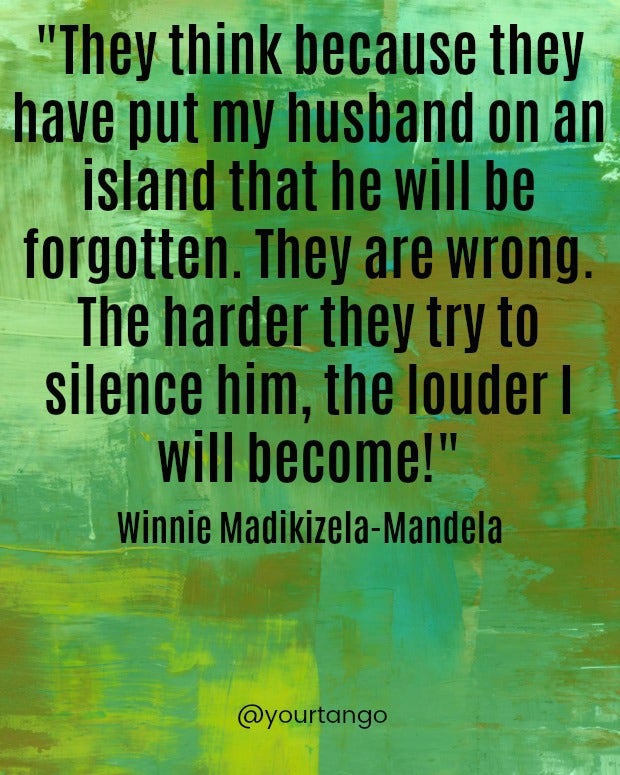
"They think because they have put my husband on an island that he will be forgotten. They are wrong. The harder they try to silence him, the louder I will become!"
8. She would never bow to racial oppressors.
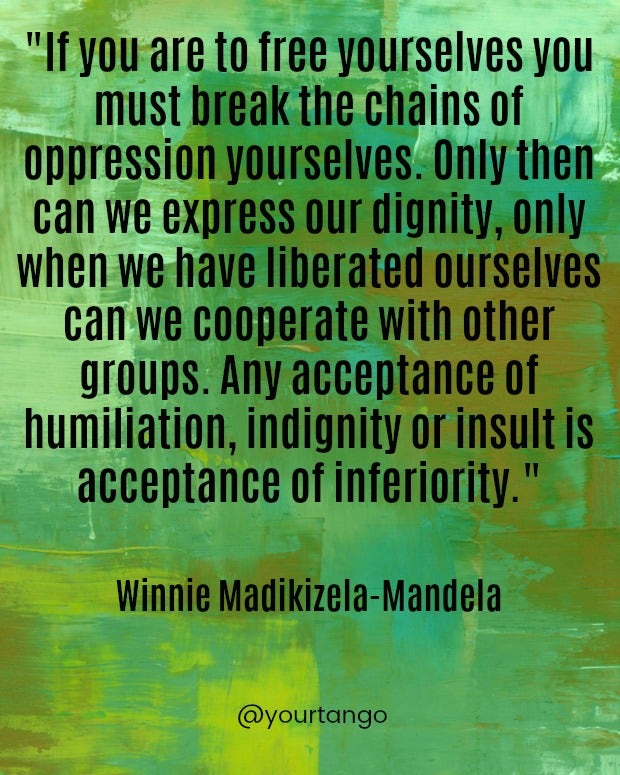
"If you are to free yourselves you must break the chains of oppression yourselves. Only then can we express our dignity, only when we have liberated ourselves can we cooperate with other groups. Any acceptance of humiliation, indignity or insult is acceptance of inferiority."
9. She sometimes promoted violence.
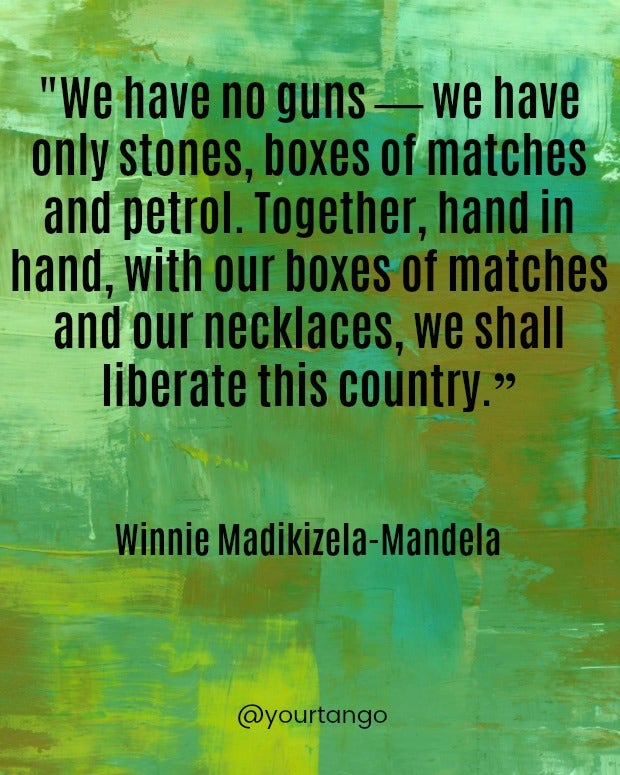
"We have no guns — we have only stones, boxes of matches and petrol. Together, hand in hand, with our boxes of matches and our necklaces, we shall liberate this country.”
10. She never shied away from calling out the patriarchy.
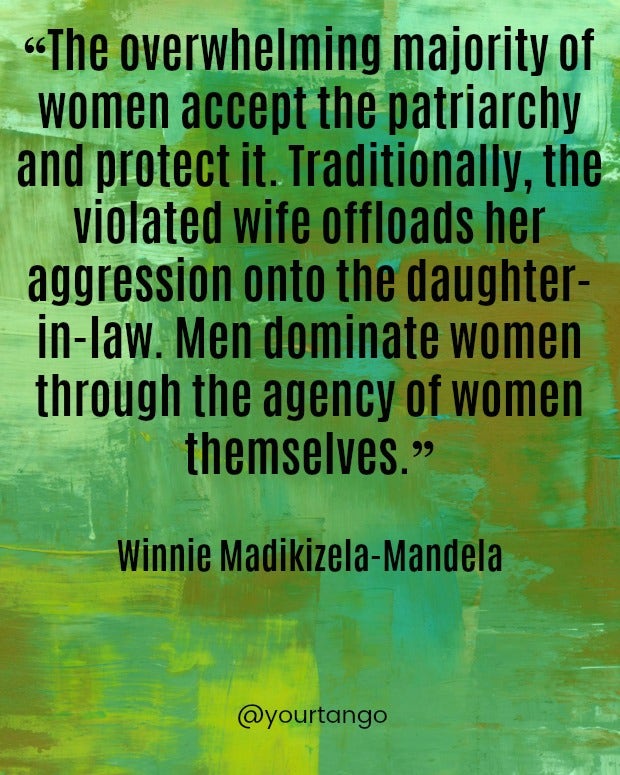
“The overwhelming majority of women accept the patriarchy and protect it. Traditionally, the violated wife offloads her aggression onto the daughter-in-law. Men dominate women through the agency of women themselves.”
11. On the battles that were fought to end Apartheid.
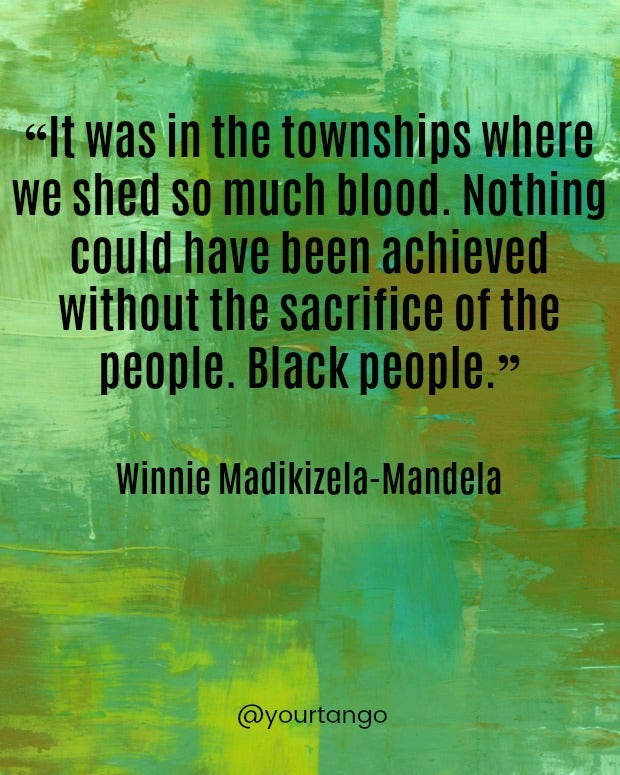
“It was in the townships where we shed so much blood. Nothing could have been achieved without the sacrifice of the people. Black people.”
12. She wasn't afraid to call out political leaders.
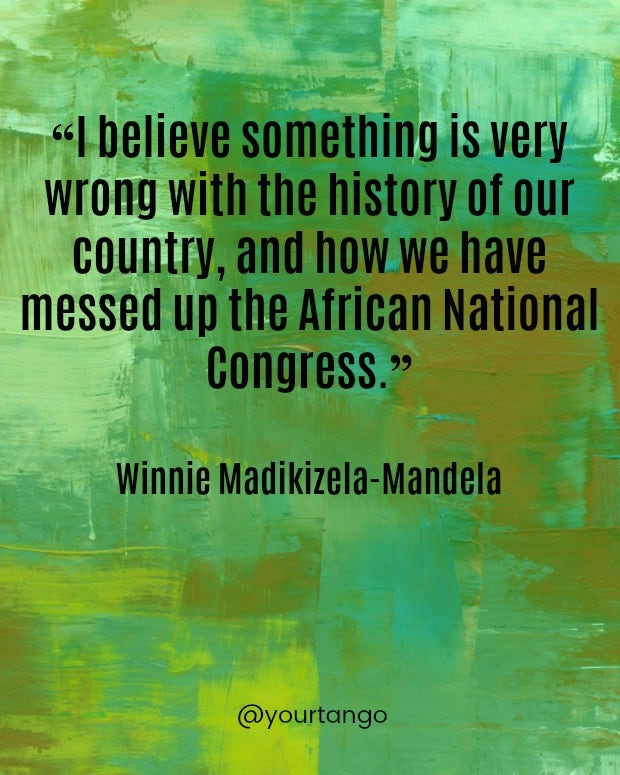
“I believe something is very wrong with the history of our country and how we have messed up the African National Congress.”
13. She held fast to her beliefs and refused to apologize.
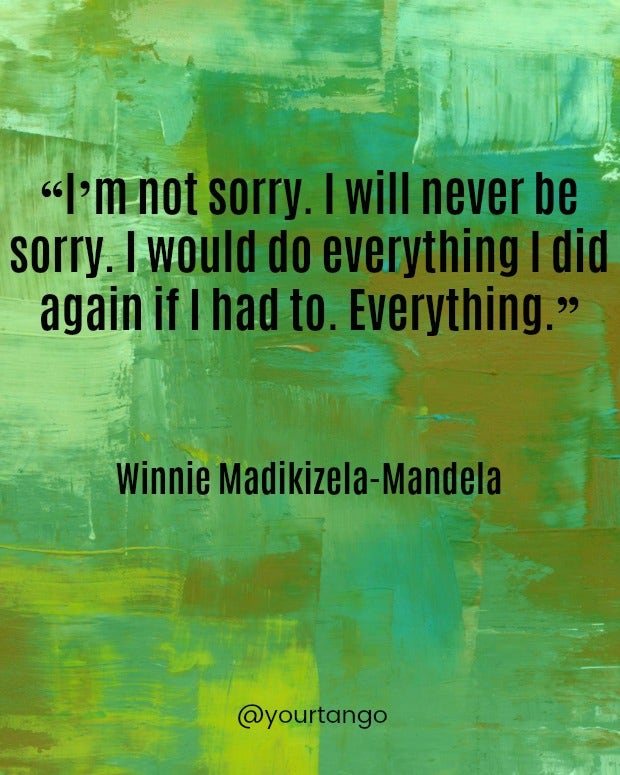
“I’m not sorry. I will never be sorry. I would do everything I did again if I had to. Everything.”
14. She even called out her own husband.
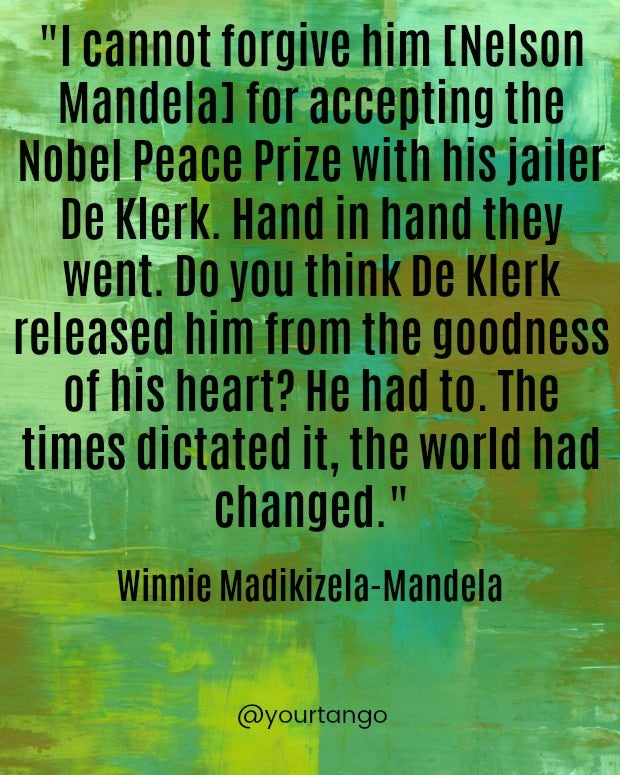
"I cannot forgive him [Nelson Mandela] for accepting the Nobel Peace Prize with his jailer De Klerk. Hand in hand they went. Do you think De Klerk released him from the goodness of his heart? He had to. The times dictated it, the world had changed."
15. She saw an opportunity to promote change everywhere.
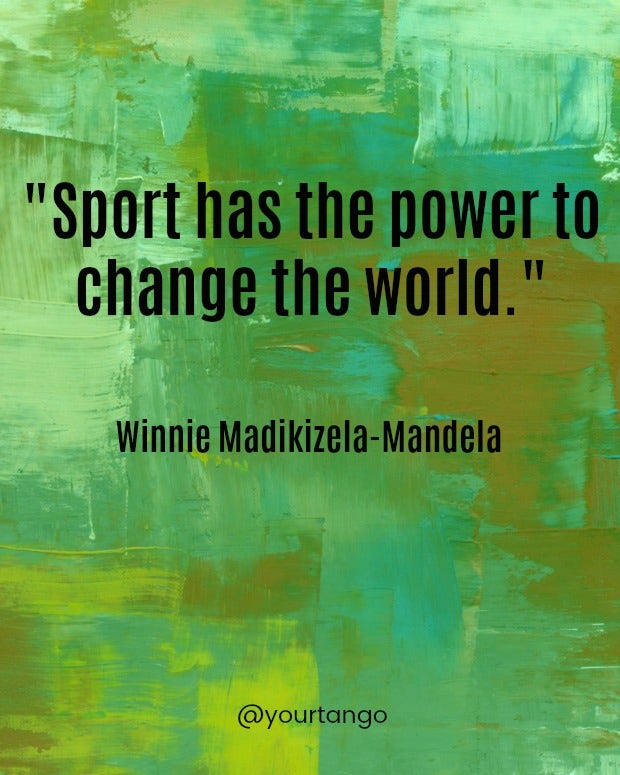
"Sport has the power to change the world."
Rebecca Jane Stokes is a writer living in Brooklyn, New York with her cat, Batman. She hosts the love and dating advice show, Becca After Dark on YourTango's Facebook Page every Tuesday and Thursday at 10:15 pm Eastern. For more of her work, check out her Tumblr.

